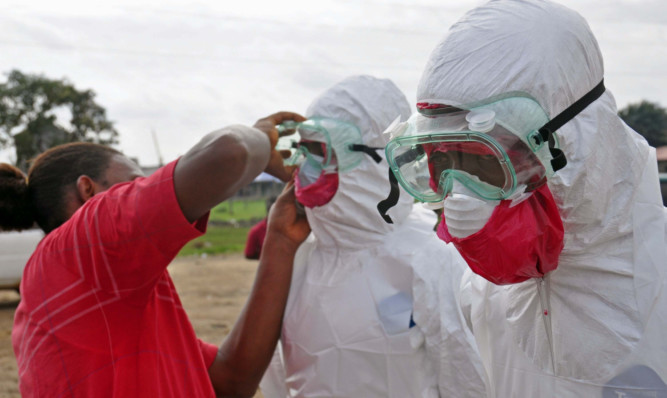
British universities have been put on red alert over fears that overseas students could bring the deadly Ebola virus to UK campuses.
The Sunday Post has learned worried uni chiefs held crunch talks with authorities over how to deal with the killer disease.
Experts fear campuses could prove to be an ideal breeding ground for Ebola.
The dire warning comes only days after the World Health Organisation described the outbreak which has so far claimed more than 1,000 lives as “vastly underestimated”.
Yesterday it was announced a woman from Sierra Leone who was being detained at Dungavel Detention Centre in South Lanarkshire had tested negative for the virus.
Dr Derek Gatherer, a leading virologist at Lancaster University, said: “Contagious diseases thrive in confined spaces.
“Ebola could flourish in places such as prisons but also in universities and halls of residence where people are sitting next to each other and sharing facilities like toilets.”
The disease is already wrecking havoc behind the scenes at universities as they prepare for the next academic year.
Our investigation found uni bosses have:
Ordered sick international students to stay away from lectures in case they have the disease.
Banned academics and students travelling to affected countries.
Warned West African students their applications for a place could be delayed for up to six months.
Last week Public Health England issued advice for educational and childcare bodies on how to spot Ebola victims.
The document has since been circulated by Scotland’s 14 Health Boards.
But frantic uni chiefs are worried about an outbreak among students and are demanding Government officials brief them on what to do if there is one.
An education source said: “The governing body, Universities UK, have been getting calls all summer from senior uni officials about what they should do.
“Unis get people from all over the world and there are fears that’s how Ebola could sneak in to the UK through a student.
“It’s a sensible precaution. But international students are big business to unis so they don’t want to overreact.”
More than 250,000 non-EU students study in the UK in an industry worth around £12 billion a year.
They pay full fees of between £9,000 and £26,000 a year, depending on their course.
It’s not known exactly how many undergraduates are from West Africa, the area worst affected by the Ebola outbreak.
Nigeria is the third biggest market for non-European students with around 20,000 Nigerian nationals registered to study in the UK.
Only India and China provide more.
There have been 13 identified cases of Ebola in recent weeks in Nigeria’s capital, Lagos, the most populous city in Africa.
However, the majority of the 1,975 cases have come from Guinea, Sierra Leone and Liberia.
It is unclear how many students in the UK come from these countries but the population is believed to be sizeable.
A spokeswoman for NHS body National Services Scotland said: “Many of the students who attend university in Scotland come from Nigeria.
“At present, WHO does not consider it as a country with risk of Ebola transmission in the same way as Guinea, Sierra Leone and Liberia.
“At the start of the new university term, students will be arriving from all over the world.
“Universities are advising their students on arrival that, if they become unwell with a fever within 21 days of having been to an affected country, they should not attend lectures, they should let the authorities know immediately and seek medical help.”
Leading bacteriologist Professor Hugh Pennington said: “We need to make it clear that if students from West Africa are feeling unwell after coming to this country, they should seek medical advice straight away.
“The universities are being cautious but that’s an entirely sensible stance to take.”
Dr Derek Gatherer added: “Let’s be clear the risk of Ebola coming to the UK is low.
“But the disease is as infectious as the flu so it is good organisations are looking at worst-case scenarios.”
A spokesperson for Universities UK said: “Universities take the welfare of all their students and staff very seriously.
“From contact we have had over the past few weeks, we know many are closely monitoring the situation with regard to the Ebola outbreak in West Africa and any impact this may have on their institution.
“Universities UK has been, and will remain, in close contact with government officials and public health agencies on this issue to ensure we can advise and support our members.
“We are also working closely with other organisations to ensure the appropriate advice reaches relevant individuals within student services and university administration.”
There is no known cure for Ebola, a virus which is transmitted by contact with bodily fluids like blood, sweat, urine, diarrhoea and vomit and can cause organ failure and unstoppable bleeding.

Enjoy the convenience of having The Sunday Post delivered as a digital ePaper straight to your smartphone, tablet or computer.
Subscribe for only £5.49 a month and enjoy all the benefits of the printed paper as a digital replica.
Subscribe